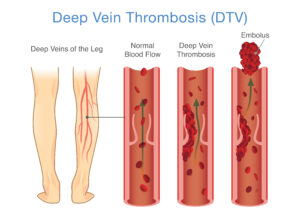
The Centers for Disease Control estimates nearly 900,000 Americans are affected each year. Data cannot be more exact because deep vein thrombosis is often underdiagnosed. Frequently, people may live with the blood clot without experiencing any symptoms.
Knowing your risks for deep vein thrombosis and what to do if you have one can prevent severe complications.
What Are the Risk Factors for Developing DVT?
The Mayo Clinic outlines significant risk factors for developing deep vein thrombosis:
- Age: Those over the age of 60 are at increased risk.
- Inactivity: Those who remain bedridden or seated for extended periods at great risk.
- Medications: Some medications may increase the risk of developing blood clots.
- Obesity: This can affect your circulatory system and lead to blood clots.
- Smoking: Smoking influences how your blood flows.
- Genetics: Inherited disorders related to clotting or a family history of blood clots may influence your risk.
- Pregnancy: This can increase the pressure within the veins of your legs and pelvis.
While some of these risk factors are out of your control, there are some you do have influence over.
What You Can Do to Lower the Risk of DVT
Cessation of smoking, increasing physical activity, and eating a diet that consists of heart-healthy foods, such as foods rich in vitamins and minerals, can help lower your risk of DVT.
Find DVT Treatment at Suffolk Vascular & Vein Center
While some instances of DVT may be asymptomatic, there are times when pain and tenderness in the legs could be signs of deep vein thrombosis. The best thing to do if you’re at risk, whether you’re experiencing pain or not, is to undergo testing at Suffolk Vascular & Vein Center.
With three convenient locations in Port Jefferson Station (631-476-9100), Hauppauge (631-979-0222), and Riverhead, NY (631-591-9003), our expert care is never too far. Contact us today to begin your treatment journey.

